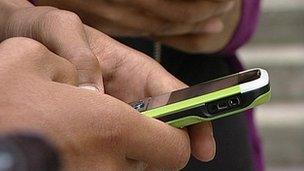Pupils 'should be taught about risks of pornography'
- Published

Young people should be taught about the risks of sexual imagery, say teachers
Pupils should be given lessons about the dangers of pornography, teachers say.
Pornographic images have never been more widely available, the Association of Teachers and Lecturers warns.
The ATL, meeting for its annual conference, says it is vital children do not become desensitised to graphic, sometimes aggressive, sexual imagery.
The teachers' union says staff need more guidance on how to tackle this over-sexualised youth culture.
Teachers highlighted their concern about children having access to books such as Fifty Shades of Grey.
Helen Porter, a teacher from Newbury in Berkshire, told the union's conference in Liverpool: "It is crucial that youngsters develop an understanding of sex in the media and pornography, so that they can recognise the abnormal nature of these sexual expectations and appreciate the dangers of accepting the values portrayed by the sexualised media."
Ms Porter said pornographic images led to unrealistic expectations.
"Boys who become familiar with pornography develop certain expectations of girls' bodies. Girls feel under pressure to conform to these ideals."
'Abusive'
Seconding the conference motion to raise awareness of the problem, Berkshire teacher James Schlackman said the debate should not be regarded as "moralistic lecturing", because young people today were being exposed to "dangerously unrealistic portrayals of sex".
"Much of it [pornography] is aggressive, some of it bordering on abusive," said Mr Schlackman.
"It doesn't show normal sexual behaviour, but there is so much of it that to young people, without the benefit of experience, it appears to be normal."
Mr Schlackman said these images risked damaging children's relationships both now and in the future.
He also warned that pornography made children more vulnerable to abuse.
"Child protection experts know that a key method used to groom children for abuse is to normalise sexual behaviour to that child, to make it seem like what the abuser is asking from them is nothing unusual.
"Today, children are doing that on their own. They are routinely taking sexual photographs of themselves and sending them to others.
"They are becoming desensitised to the very activities that make them vulnerable to abuse."
Fifty Shades of Grey
One teacher told the conference she feared books like Fifty Shades of Grey normalised sexually abusive relationships.
Niamh Sweeney from Cambridgeshire argued: "It is not erotic fiction - it describes a violent and abusive relationship where a young girl admits to being hurt, not enjoying it but agreeing to it because she know he likes it."
Ms Sweeney said she had discussed the book with her lower sixth class and used it to discuss the dangers of being forced "to do something they do not want to do".
Alison Sherratt, an ATL member from Bradford raised concerns that even very young children have access to explicit images.
"It is a fact that very many of our youngest children are exposed to a wide variety of images of a pornographic nature, found even in what may be seen to be the most innocent magazines," she said.
"Little ones are seeing inappropriate films and video games while staying up late or being in the same room as other siblings.
"We are noticing a much more explicit vocabulary emerging and types of games amongst the very young that are quite sexually explicit."
- Published22 January 2013